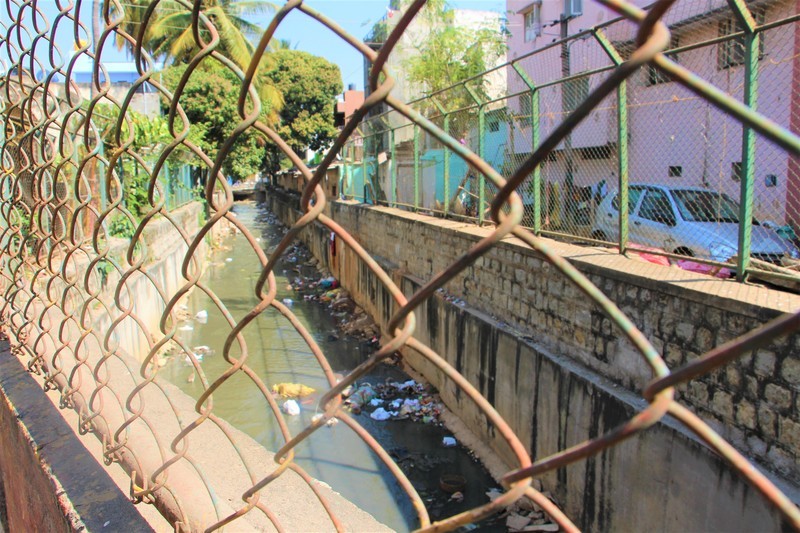Editors' Perspective: Urban Transformations
The need for plural valuation and intersectional approaches to urban governance and sustainability transformations
With the COP26 summit closing off after two weeks of intense debates in Glasgow, Scotland, our two recently joined editors of npj Urban Sustainability, Prof. Christopher M. Raymond and Prof. Vanesa Castán Broto share their reflections on urban sustainability and transformations.

Photo credit: a canal in Bangalore, India by Dr. Vanesa Castán Broto
In the light of national governments’ failure to reach ambitious multi-level actions at COP26, cities will continue to address the interconnected issues of climate change, biodiversity loss, pandemics, and social inequality. Rapid and systemic transformations toward sustainability in cities globally will require enormous changes to the steering arms of urban governance, including rethinking growth and justice across social, ecological, and technological systems.1 Rethinking growth entails broadening the values of nature in urban decision-making and opening up spaces for more plural valuation approaches in urban governance and active learning, experimentation, and decision-making.2 UN-Habitat has argued that prioritizing the needs of the most disadvantaged is essential to harness the value of sustainable urbanization.3 Rethinking justice implies co-designing and implementing multiple forms of hybrid governance that promote equal and fair access to nature-based and climate solutions while at the same time addressing issues of intersectional inequality.4
 Christopher Raymond, PhD
Christopher Raymond, PhD
Professor, Ecosystems and Environment Program and Department of Economics and Management
Helsinki Institute of Sustainability Science (HELSUS), University of Helsinki
Helsinki, Finland
The environmental valuation literature is currently experiencing a ‘plural turn’ characterized by an emphasis on engaging diverse and underrepresented voices in environmental decision-making.5 More plural conceptualizations of social values for sustainability consider different theoretical positions on values,6 including instrumental, relational, and intrinsic values of nature.7,8 New knowledge weaving processes and planning frameworks aim to surface power relations among stakeholders who hold different values, have differing levels of influence on political decision-making processes, and filter which or whose values inform urban governance.9,10 The IPBES Values Assessment is currently identifying a range of plural valuation techniques for integrating the multiple values of nature, drawing upon different forms of scientific, indigenous, and local knowledges. The Summary for Policy Makers will be reviewed in plenary by governments across the global at IPBES 9, Bonn, July 2022. Moreover, adaptation experiences show that subaltern forms of knowledge- knowledge excluded from the dominant decision-making processes- are essential for fair and just adaptation.11 The Sixth Assessment Report of the Intergovernmental Panel on Climate Change has also paid particular attention to diversifying the knowledge base, reflecting a wide range of experiences of climate impacts. For example, indigenous scholars produced a compendium to include Indigenous Knowledge (IK) and local knowledge (LK) into international assessments such as the IPCC and IPBES.12
 Vanesa Castan Broto, Ir, MSc, EngD
Vanesa Castan Broto, Ir, MSc, EngD
Professor of Climate Urbanism, Urban Institute
University of Sheffield
Sheffield, UK
There is increased emphasis on combining equity and inclusion targets within biodiversity conservation and climate policy and planning in cities. Feminist and postcolonial critiques and critical race theory, in particular, expose the strong linkages between environmental pollution and degradation and other forms of discrimination and exclusion. In urban environments, climate justice entails examining the differential impacts of climate change in urban populations and how climate change impacts and human responses further entrench existing patterns of inequality.13 The tradition of black feminism has developed a strong critique of how different experiences of discrimination and exclusion are unique to people, depending on the social positions concerning identity labels such as race, ethnic group, age, ability, gender, or sexual and gender nonconformity. In this vein, intersectionality theory investigates how power relations influence individual and collective experiences of social life.14 The work of intersectionality scholars is increasingly influential in urban environmental studies,15 influencing a new generation of scholars who realize that understanding sustainability transformations requires engaging with the complex social dynamics of environmental change. We hope to see this body of scholarship increasingly reflected in our journal.
Supporting inclusive conservation in cities, resilience, and just transformations toward sustainability will require scientific advances at the interface of plural valuation, environmental justice and intersectional critiques of inequality. As new editors of npj Urban Sustainability, we warmly welcome papers that can make conceptual, theoretical, methodological and/or practical advances on topics such as:
- The combination of multiple values and experiences of nature to support just transformations
- Discrimination and exclusion in urban environmental governance, particularly adopting an intersectionality lens
- Forms of power, conflict, synergies, and trade-offs in urban governance, for example, when co-designing and implementing nature-based solutions
- Practical implications, for example, to unlock trade-offs, of deeper explorations of the multiple values of nature, and issues of environmental justice and intersectional inequality
- Place-based and social innovation for just urban transformations
References
- McPhearson, T. et al. Radical changes are needed for transformations to a good Anthropocene. npj Urban Sustain. 1, 1–13, 2021.
- Tengö, M., and Andersson, E. Solutions-oriented research for sustainability: Turning knowledge into action. Ambio (2021). https://doi.org/10.1007/s13280-020-01492-9
- 2020 World Cities Report: The Value of Sustainable Urbanization. (UN-Habitat, 2020) https://unhabitat.org/World%20Cities%20Report%202020
- Anguelovski, I. et al. Expanding the Boundaries of Justice in Urban Greening Scholarship: Toward an Emancipatory, Antisubordination, Intersectional, and Relational Approach. Ann. Am. Assoc. Geogr. 110, 1743–1769 (2020).
- Pascual, U., Adams, W.M., Díaz, S., Lele, S., Mace, G.M., and Turnhout, E. Biodiversity and the challenge of pluralism. Nat. Sustain. 4, 567–572 (2021).
- Raymond, C.M., Kenter, J.O., van Riper, C.J., Rawluk, A., and Kendal, D. Editorial overview: theoretical traditions in social values for sustainability. Sustain. Sci. 14, 1173–1185 (2019).
- Chan, K.M.A. et al. Why protect nature? Rethinking values and the environment. Proc. Natl. Acad. Sci. USA 113, 1462–1465 (2016).
- Himes, A., and Muraca, B. Relational values: the key to pluralistic valuation of ecosystem services. Curr. Opin. Environ. Sustain. 35, 1–7 (2018).
- Turnhout, E., Metze, T., Wyborn, C., Klenk, N., and Louder, E. The politics of co-production: participation, power, and transformation. Curr. Opin. Environ. Sustain. 42, 15–21 (2020).
- Patterson, J., Soininen, N., Collier, M., and Raymond, C.M. Finding feasible action towards urban transformations. npj Urban Sustain. 1, 28 (2021).
- Mustonen, T., Harper, R., Rivera-Ferre, M., Postigo, J.C. 2021 Compendium of Indigenous Knowledge and Local Knowledge: Towards Inclusion of Indigenous Knowledge and Local Knowledge in Global Reports on Climate Change. Available at http://www.snowchange.org/2021/06/increasing-inclusion-of-indigenous-knowledge-and-local-knowledge-in-international-assessment-reports/
- Olazabal, M., Chu, E., Castán Broto, V. and Patterson, J., Subaltern forms of knowledge are required to boost local adaptation. One Earth, 4, 828-838 (2021).
- Sultana, F., Critical climate justice. Geogr J. DOI: 10.1111/geoj.12417 (2021).
- For a classic approach to the topic, see: Collins, P.H. and Bilge, S., Intersectionality. (John Wiley & Sons, 2020).
- Truelove, Y., Rethinking water insecurity, inequality and infrastructure through an embodied urban political ecology. Wiley Interdiscip. Rev. Water, 6, p.e1342 (2019).
